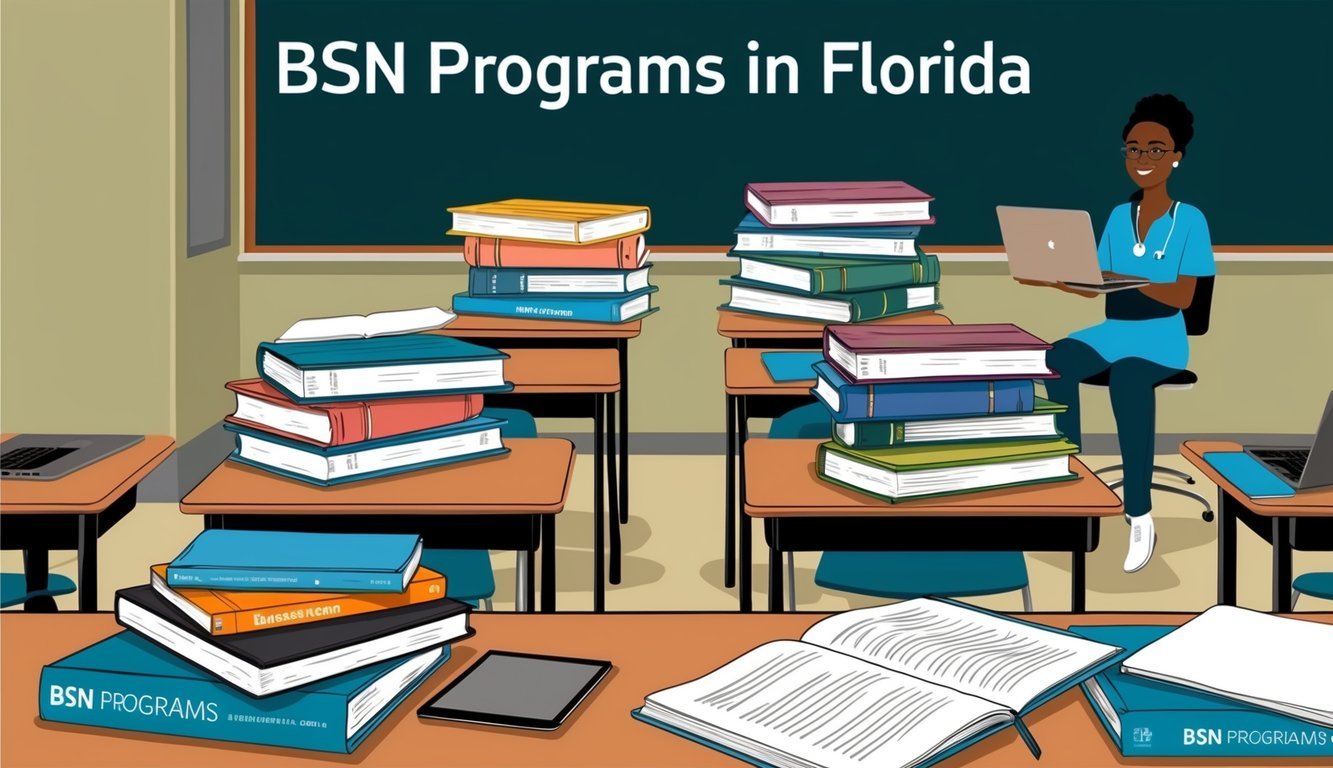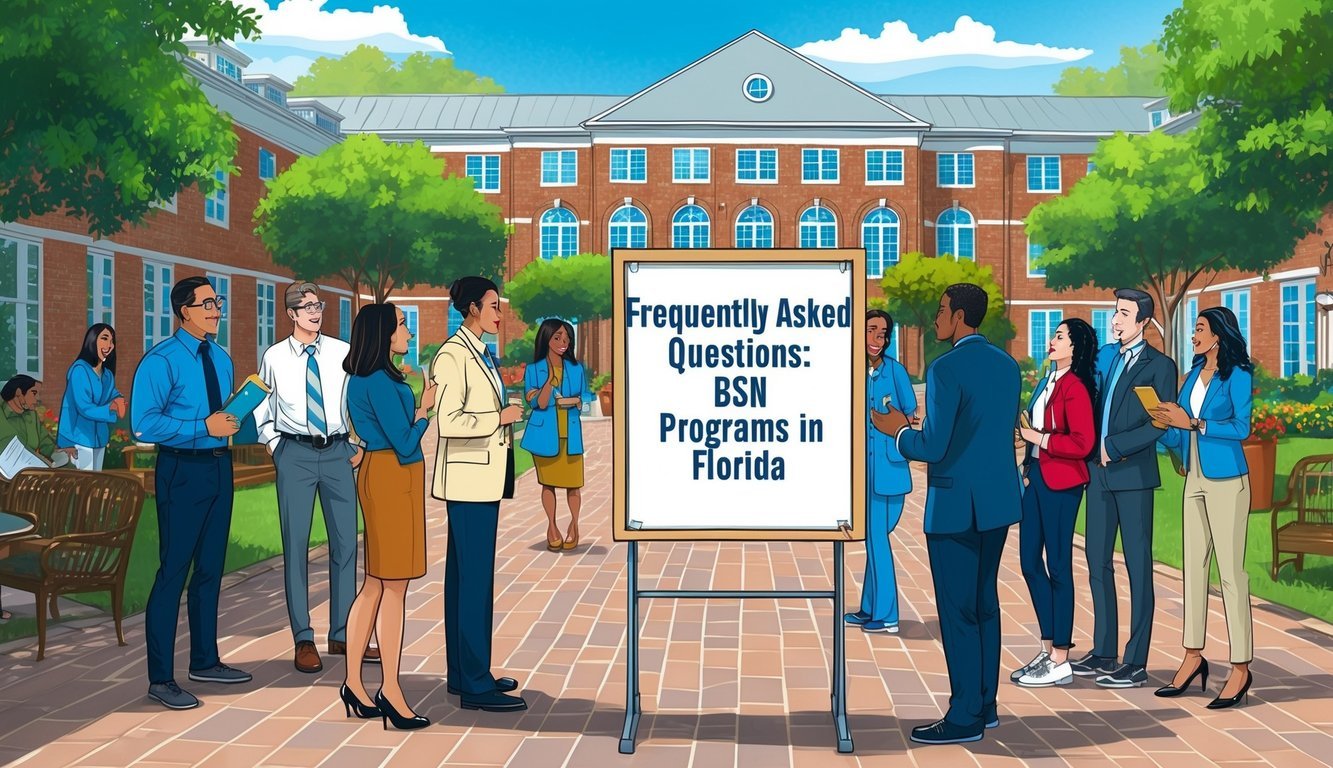Choosing the right Bachelor of Science in Nursing (BSN) program can shape your future in the healthcare field. Florida offers impressive options for BSN programs that are accredited and cater to various needs and preferences.
You will find many public and private institutions that provide quality education tailored to help you succeed as a nursing professional.
As you explore your options, consider factors like tuition costs, admission requirements, and program curricula.
Many schools, such as the University of Florida and Florida State University, rank among the best in the country and offer specialized tracks to meet your career goals.
You will want to ensure that the program you choose prepares you for the competitive job market in nursing.
Investing time in finding the right BSN program can lead to valuable career outcomes.
With a BSN, you can pursue various roles in healthcare, making a difference in patient lives while enjoying a fulfilling career path.
Key Takeaways
- Florida has several top-ranked accredited BSN programs.
- Admission requirements vary, so check with each school.
- A BSN opens doors to multiple career opportunities in nursing.
Overview of BSN Programs in Florida
BSN programs in Florida are designed to prepare you for a rewarding career as a registered nurse (RN).
These programs offer a blend of theoretical knowledge and practical skills necessary for effective nursing care.
Below are essential aspects related to BSN education in Florida.
Role and Scope of BSN in Nursing Care
A Bachelor of Science in Nursing (BSN) equips you with advanced skills for comprehensive patient care.
As an RN, you will handle various responsibilities, including assessing patient health, establishing care plans, and collaborating with other healthcare professionals.
With a BSN, you also gain essential leadership and critical thinking skills.
This degree prepares you for specialized areas in nursing, such as pediatrics, geriatrics, and emergency care.
Many employers prefer or require a BSN, leading to higher job placement rates and better salary opportunities.
Typical Structure of BSN Education
A typical BSN program in Florida lasts about four years and includes general education and specialized nursing courses.
Key Components of BSN Curriculum:
| Course Type | Example Courses |
|---|---|
| General Education | Anatomy, Psychology, Mathematics |
| Nursing Courses | Nursing Fundamentals, Pharmacology |
| Clinical Practice | Hands-on training in hospitals |
In addition to classroom learning, you will complete clinical rotations in various healthcare settings.
This hands-on experience is crucial for applying your knowledge in real-world scenarios, helping build your confidence and clinical skills.
Understanding RN to BSN Program Options
If you are already a registered nurse with an associate degree, RN to BSN programs in Florida are tailored for you.
These programs facilitate your transition to a bachelor’s degree, enhancing your qualifications.
Most RN to BSN programs can be completed in about one to two years, depending on your previous coursework.
Courses often include:
- Advanced Nursing Practices
- Community Health Nursing
- Nursing Research
Many institutions offer flexible options, such as online classes, making it easier to balance work and study.
This pathway significantly boosts your career prospects and opens doors for advancement in nursing and healthcare leadership roles.
Eligibility and Admission Criteria
When considering a Bachelor of Science in Nursing (BSN) program in Florida, it’s essential to understand the specific eligibility and admission criteria.
This includes general education requirements, nursing prerequisites, and the application deadlines and processes.
General Education Requirements
To apply for a BSN program, you typically need a high school diploma or GED.
Most schools require a minimum GPA.
| Requirement | Description |
|---|---|
| High School Diploma or GED | Required for admission |
| Minimum GPA | Generally 2.5, though some prefer 3.0 |
You will also need to complete certain general education courses.
These may include subjects like English, Psychology, Biology, and Chemistry.
Completing these courses early can prepare you for your nursing coursework.
Make sure to check specific requirements for each program as they can vary.
Nursing Prerequisites
Nursing prerequisites are key to your application.
Common prerequisites include courses in Anatomy, Physiology, Microbiology, and Statistics.
| Prerequisite Course | Typical Credits |
|---|---|
| Anatomy and Physiology | 8 credits (2 courses) |
| Microbiology | 4 credits (1 course) |
| Statistics | 3-4 credits |
These courses help build a fundamental understanding of healthcare and prepare you for the nursing program’s demands.
Some programs may also require a background check or certification in CPR.
Be sure to verify with your chosen program for specific nursing prerequisites.
Application Deadlines and Process
Application deadlines vary by school.
It’s crucial to plan ahead to meet these dates.
| Admission Stage | Typical Timeline |
|---|---|
| Application Submission | Usually 6-12 months before program start |
| Acceptance Notification | Typically 2-3 months after application |
You will often need to submit transcripts, letters of recommendation, and a personal statement.
Some programs may also require an interview as part of the admission process.
Confirm deadlines on the program’s website to ensure you don’t miss any important dates.
Curriculum and Accreditation

When considering BSN programs in Florida, it’s essential to understand the structure of the curriculum and the accreditation of the programs.
This section will detail core nursing courses, specialized paths, and the accreditation bodies ensuring quality education.
Core Nursing Courses and Clinical Training
In a traditional BSN program, you will engage in a variety of core nursing courses that form the foundation of your education.
These typically include:
- Anatomy and Physiology
- Microbiology
- Pharmacology
- Nutrition
- Nursing Theory
In addition to coursework, clinical training is a vital component.
This hands-on experience allows you to apply classroom knowledge in real healthcare settings.
Clinical rotations often take place in hospitals, clinics, and community health environments.
You will work alongside experienced nurses and healthcare professionals, gaining essential skills before taking the NCLEX-RN for licensure.
Specialized Nursing Education Paths
Many BSN programs offer specialized education paths that cater to various nursing interests.
For example, you might choose areas like:
- Pediatric Nursing
- Geriatric Nursing
- Mental Health Nursing
- Emergency Care
These specialized tracks can enhance your employability and readiness for specific nursing roles.
Some programs may also offer accelerated options for those with prior degrees, enabling you to complete your BSN in a shorter time frame.
This flexibility can help you enter the workforce sooner while meeting the demands of different healthcare settings.
Accreditation Bodies for Nursing Programs
Accreditation is crucial in ensuring that nursing programs meet high educational standards.
In Florida, many programs are accredited by recognized bodies such as:
- Commission on Collegiate Nursing Education (CCNE)
- Accreditation Commission for Education in Nursing (ACEN)
These organizations assess the quality of nursing education and ensure that programs prepare students effectively for taking the NCLEX-RN.
Enrolling in an accredited program is important, as it can affect your eligibility for financial aid and job opportunities after graduation.
Always check for accreditation before committing to a program.
Career Outcomes and Opportunities

Earning your Bachelor of Science in Nursing (BSN) opens numerous career paths and advancement opportunities.
You can explore various nursing roles, enhance your leadership skills, and pursue continuing education to stay current in the field.
Potential Nursing Careers and Specializations After BSN
With a BSN, you can pursue a variety of nursing careers, including:
- Registered Nurse (RN): Directly involved in patient care in hospitals and clinics.
- Clinical Nurse Specialist (CNS): Works in a specific area of healthcare, focusing on improving patient outcomes.
- Nurse Practitioner (NP): Provides advanced care, often diagnosing and treating patients.
- Health Educator: Collaborates with communities to promote wellness and disease prevention.
These roles allow you to work in diverse clinical settings, ranging from hospitals to community health organizations.
For more information on specific nursing roles, you can visit NursingProcess.org.
Leadership Roles and Advancements
A BSN prepares you for leadership roles within the nursing field.
As you gain experience, you may qualify for positions such as:
- Nurse Manager: Oversees nursing staff and operations within departments.
- Clinical Nurse Leader (CNL): Coordinates patient care and implements quality improvement initiatives.
Advancing your education further, such as by pursuing a Doctor of Nursing Practice (DNP) program, can position you for top-tier administrative roles.
In these capacities, you will influence healthcare policies and practices in your organization.
Licensure and Continuing Education
Passing the NCLEX-RN exam is required to obtain RN licensure after earning your BSN.
This step is crucial as it ensures you meet the standards to provide safe and effective nursing care.
Continuing education is essential to maintain your license and grow in your nursing career.
Opportunities for professional development include:
- Specialization certifications.
- Advanced practice roles, which allow for greater autonomy and responsibility.
- Workshops and conferences to stay updated on best practices.
Investing in your education not only enhances your skills but also opens doors to new career opportunities in nursing.
Florida-Based BSN Programs and Universities

Florida offers several respected Bachelor of Science in Nursing (BSN) programs.
These programs prepare you for a successful nursing career, providing strong clinical experiences and academic foundations.
University of Florida College of Nursing
The University of Florida (UF) College of Nursing is highly regarded for its nursing programs.
It offers a Bachelor of Science in Nursing that emphasizes quality education and hands-on training.
Key Features:
- Accreditation: The BSN program is accredited by the Commission on Collegiate Nursing Education (CCNE).
- Clinical Experience: Students participate in diverse clinical experiences across various healthcare settings.
- Gator Nurse Network: Graduates join a robust alumni network that provides resources and support.
With a focus on academic excellence, the UF program ranks among the top in the nation, preparing you to meet the demands of the nursing field.
Florida State University College of Nursing
Florida State University (FSU) also offers a competitive BSN program.
This program is designed for both traditional students and those seeking to enter nursing as a second career.
Key Features:
- Limited Enrollment: Admission is selective, ensuring a focused learning experience.
- Curriculum: The program covers essential nursing skills, ethics, and evidence-based practice.
- Clinical Rotations: You will gain hands-on experience in various healthcare environments.
The FSU College of Nursing prepares you well for the National Council Licensure Examination (NCLEX), helping you transition smoothly from student to practicing nurse.
University of Central Florida College of Nursing
The University of Central Florida (UCF) College of Nursing offers an innovative and supportive BSN program.
The program is known for its commitment to research and community health.
Key Features:
- Diverse Options: UCF provides full-time and part-time study options to fit your needs.
- Interprofessional Learning: You will collaborate with students from other healthcare disciplines.
- Simulation Labs: Advanced simulation technologies enhance your clinical skills.
This program focuses on producing compassionate nurses equipped to handle the challenges of modern healthcare, aligning with the standards set by the Florida Board of Nursing.
Practical Considerations and Student Resources

As you navigate the journey of obtaining a Bachelor of Science in Nursing (BSN) in Florida, understanding your options for financial aid, student support, and program flexibility can significantly enhance your experience.
Here are some key resources and considerations to explore.
Financial Aid and Scholarships
Financial aid can alleviate the burden of tuition costs.
You may apply for various types of aid including federal and state grants, scholarships, and loans.
Types of Financial Aid:
- Federal Grants: Such as Pell Grants, available based on financial need.
- State Grants: Florida offers grants for residents in nursing programs.
- Scholarships: Many universities, including University of Florida, provide scholarships specifically for nursing students.
You should fill out the Free Application for Federal Student Aid (FAFSA) to start.
Additionally, some private companies and organizations offer scholarships based on merit or need.
Checking with your school’s financial aid office can also provide tailored options.
Student Organizations and Support Services
Joining student organizations can greatly enrich your nursing education.
Many nursing schools have associations that foster networking and professional development.
Benefits of Student Organizations:
- Networking: Meet peers and professionals in the nursing field.
- Workshops and Conferences: Opportunities to attend events that enhance your learning.
Universities like Florida State University often have support services including mentorship programs, academic advising, and mental health resources.
These services can help you balance studies with personal well-being, contributing to job security after graduation.
Online BSN Programs and Flexibility
Flexibility is key for many students balancing work and family.
Online BSN programs in Florida are increasingly popular, offering the same quality education as traditional formats.
Key Features of Online BSN Programs:
- Asynchronous Classes: Attend lectures and complete assignments on your schedule.
- Clinical Requirements: Many programs help arrange local placements for hands-on experience.
Universities like UF Online provide resources for online students, including academic support and access to health insurance options.
Be sure to research these programs thoroughly to find one that fits your lifestyle and goals.
Frequently Asked Questions

This section provides answers to common questions about BSN programs in Florida.
You will find details about enrollment requirements, program duration, costs, and potential salaries after graduation.
What are the requirements for enrolling in a BSN program in Florida?
To enroll in a BSN program in Florida, you typically need a high school diploma or equivalent.
Most programs also require you to complete specific prerequisite courses, such as biology, chemistry, and math, with a satisfactory GPA.
Some schools might ask for a personal statement or letters of recommendation.
Which institutions offer the best BSN programs in Florida?
Several institutions are highly regarded for their BSN programs.
Florida State University and the University of Central Florida are among the top public options.
Private universities, such as the University of Miami, also offer strong BSN programs.
Researching each school’s accreditation and NCLEX passing rates can help you choose.
Can you complete a BSN program in Florida entirely online?
Yes, some institutions offer online BSN programs.
These programs are designed to be flexible and can usually be completed from anywhere.
However, you may still need to attend some in-person clinical sessions to meet the program requirements.
How long does it typically take to complete an accelerated BSN program in Florida?
An accelerated BSN program usually takes about 12 to 18 months to complete.
These programs are for individuals who already have a bachelor’s degree in another field and want to transition into nursing quickly.
They involve a rigorous and intensive course load.
What is the average cost of attending a BSN program in Florida?
The cost of BSN programs in Florida varies widely.
On average, public schools charge between $12,461 and $37,160 for the entire program.
Private institutions can range from around $43,851 to $204,799.
It’s essential to consider both tuition and additional fees.
| Type of Institution | Average Cost |
|---|---|
| Public (In-State) | $12,461 – $37,160 |
| Private For-Profit | $43,851 – $196,975 |
| Private Not-for-Profit | $59,558 – $204,799 |
What kind of salary can graduates of BSN programs in Florida expect?
Graduates from BSN programs in Florida can expect to earn an average salary of around $72,000 per year.
This figure translates to roughly $34.62 per hour.
Salaries can vary based on factors such as location, experience, and type of healthcare facility.

